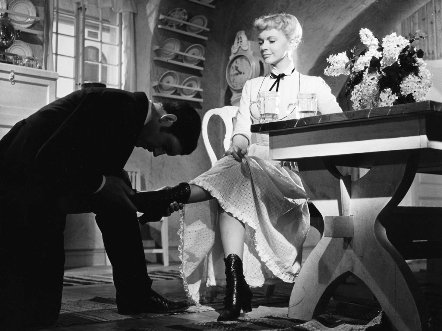 Alf Sjöberg’s 1951 adaptation of the famous Strindberg play illuminates the dark ambiguity of this story of a reckless young woman of the Swedish upper classes and her cat-and-mouse relationship with a male servant.
Alf Sjöberg’s 1951 adaptation of the famous Strindberg play illuminates the dark ambiguity of this story of a reckless young woman of the Swedish upper classes and her cat-and-mouse relationship with a male servant.
Classic plays aren’t often made into classic films. Miss Julie, a Swedish film from 1951 directed by Alf Sjöberg, is one of the exceptions. Julie, played here by Anita Björk, is the arrogant and unhappy daughter of a country nobleman, who attends a midsummer eve peasant dance on her estate, and becomes emotionally entangled with her father’s groom Jean (played by Ulf Palme), who switches between an attraction to Julie and a class-based resentment of her.
This is of course an adaptation of August Strindberg’s famous play of the same name. I had read the play in translation several times, and could never grasp why it was considered important or even good, a problem that I attributed to the language barrier. But watching the film version provided me with a rare experience—for the first time I was able to understand and appreciate the work.
It’s customary for a filmmaker to try to “open up” a play by moving the action outdoors or between rooms—Miss Julie is a one-act drama that takes place in a single room, so this would be the obvious way to go—yet this method is often little more than an artificial attempt at extension. Not in this case, however. Sjöberg’s fluid movement between scenes is coupled with a strong feeling for space and depth—things have really opened up so that we can see Julie and the servants in the context of their environment. Later in the film, Sjöberg expands time just as he did space, bringing the story of Julie’s past visibly into the room as she tells Jean about her childhood.
In addition, the two leads are excellent—especially Anita Björk, who makes you see the complex, self-lacerating passion of her character in three dimensions. It’s a remarkable performance. On the page, Jean always seemed to me a mere manipulator, but Palme, with a peculiar mix of charm and disdain, gives him life and makes Julie’s attraction to him believable. Most importantly, the climax of the play, which always seemed improbable to me, is arrived at here with a feeling of complete conviction and inevitability.
When all is said and done, I still have trouble accepting the back story Strindberg contrived for his heroine. The fault is laid at the door of her proud mother, a stereotype of feminist resentment, who raised Julie to be a kind of weapon of revenge against men. Strindberg clothed his misogyny in modern psychological garb, but it detracts from the powerful artistry that is evident when he portrays the emotional warfare between Julie and Jean. Sjöberg, however, pulls off a miracle, taking a very knotty one-act play and turning it into a compelling film with an almost flawless rhythm and visual flair.
There are other versions of the play on film, but you should try to see this one. It’s available on DVD from the always excellent Criterion.

A country village in Japan is threatened by a tourism company in this enigmatic film from Ryûsuke Hamaguchi. Japanese director Ryûsuke Hamaguchi is an...

2017 was a horrible year, but the year in film wasn’t too bad. Chris Dashiell names his favorite 2017 releases. It’s that time of...

Toshirô Mifune plays a cop in postwar Tokyo who has suffered the humiliation of having a criminal take his gun from him, in one...